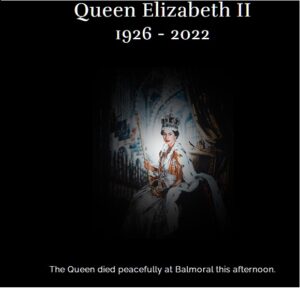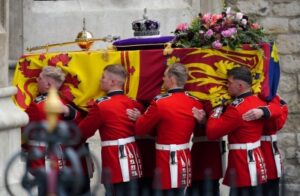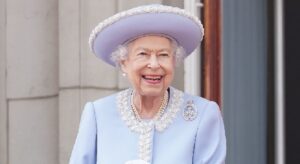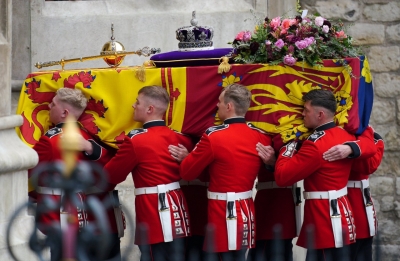Sep 19 (IANS) Britain’s Queen Elizabeth II on Monday afternoon began her last journey- 25 mile stretch westward from Westminster Abbey in central London to Windsor Castle in the county of Berkshire, where she spent much of her time in recent years.
There she was to be laid to rest at the royal chapel next to her beloved husband Prince Phillip, who predeceased her in 2021. Only members of the British royal family, led by her successor King Charles III, attended the private ceremony.
Earlier, in an hour long church service at the Abbey, which has existed and expanded since 960 AD and is located in central London, Elizabeth, who reigned for 70 years, was given the grandest of final farewells. She had got married at the same Abbey 75 years ago.
President of India Droupadi Murmu was present at the proceedings. Compared to other Commonwealth heads of government or state, she unassumingly arrived early at the venue, wearing a dark blue silk sari and a cardigan. She took her appointed seat in the midst of 2,000 assembled invitees. On Sunday evening, she attended a reception hosted by Charles and Queen Consort Camilla for 500 foreign dignitaries. Charles greeted the President warmly and was seen engaged in a brief conversation with her.

In an Anglican Christian service, with leaders of multiple religions in the audience, Baroness Patricia Scotland, Secretary General of the Commonwealth – an organisation near and dear to Elizabeth – read the first lesson from Paul’s first letter to the Corinthians about the ressurrection of Jesus Christ. She was followed by the British Prime Minister Liz Truss, who read a passage from John, which said: ‘Let not your heart be troubled…’
Then spoke the Archbishop of Canterbury Justin Welby, who is the global head of the Church of England. He said: “She (Elizabeth) was present to so many, touching a multitude of lives.”
Emperor Naruhito of Japan, President Joe Biden of the US and President Emmanuel Macron of France were among a galaxy of foreign dignitaries seated either side of the south and north aisles. “I’ll miss her terribly,” said Canadian Prime Minister Justin Trudeau. Canada, Australia and New Zealand, among other territories, were among the “realms” where Elizabeth was head of state and Charles now is.
All living former British Prime Ministers and their spouses were noticeable attired in black, like most others.
On what was declared a Bank Holiday, there was no Monday morning traffic in the British capital. Sniffer dogs, though, were busy in the area around the Abbey to prevent any untoward incident.

The live television coverage by BBC was projected on big screens at spacious locations around Britain. Tens of thousands camped overnight in such places to ensure they got a ringside view of the state adieu to Elizabeth. 125 cinemas in the country reportedly showed the ceremonies live as well.
200 other nations, including India, watched simulcasts of the coverage via the BBC World News channel or bbc.com. Foreign TV networks like PBS, CNN and Fox of the US and ABC of Australia, with their own anchors and studio commentators, covered the event in parallel.
The scale of global interest was unprecedented. Increasingly, from 8 a.m., accredited reporters hovered around the Abbey. This day was inevitable and had been planned for years by the royal household. Nevertheless, the organisers gave themselves 11 days’ time between Elizabeth’s death to her funeral to get it right.
At 6.30 a.m., the last of the estimated three quarter of a million mourners filed past the coffin lying in state at Westminster Hall in the Houses of Parliament opposite the Abbey. Disruptions on trains arriving in London and parts of the city’s underground system inconvenienced commuters.

15 minutes before the service commenced, the coffin was ceremonially moved in a gun carriage with soldiers in accompaniment from Westminster Hall to the Abbey. Charles, his brothers Andrew and Edward, sister Anne and sons William and Harry followed the body on foot.
Finally, the coffin, with Elizabeth’s crown placed on it – as it has been for days – was carried away from the Abbey on the shoulders of soldiers in bright red tunics into a sunny courtyard, which faces London’s Parliament Square, the centrepiece of which is a statue of Mahatma Gandhi.
Back on the gun carriage, Charles and family and soldiers of various armed forces marching around it, Elizabeth embarked on her triumphant last journey via Buckingham Palace, her London home, to the green and pleasant fields of Windsor.

